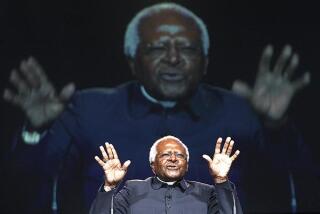Oath-Taking Caps 30-Year Struggle for Nujoma
- Share via
WINDHOEK, Namibia — When Sam Nujoma took the oath as president of this newborn nation today, it marked the end of a personal battle for liberation that began almost exactly 30 years ago when the rebel leader slipped out of the territory to launch a bush war against South African colonialists.
Nujoma, a stocky man of 60 years with a thick white beard, has been called uneducated and ruthless by his opponents and a kindly man of the people by his supporters.
A former assistant and now political opponent has said Nujoma is “a very dull person, basically.” But Nujoma’s closest comrades in the South-West Africa People’s Organization describe him as a charismatic leader with shrewd political skills who has survived several challenges to his leadership while in exile.
Nujoma has been welcomed since his return to Namibia six months ago as a conquering hero, especially in the most populous north, home of his Owambo people and the center of SWAPO’s support. His cherubic, smiling face looks out from posters, flags and T-shirts all across the country. And his speeches have drawn tens of thousands.
Samuel Shaffishuna Nujoma, whose formal education ended with primary school, got his start in politics in the late 1950s, when he was fired from his job as a steward on the South African railway for union activity. When the Windhoek municipality decided to relocate blacks near the city to what is now the township of Katutura, Nujoma joined a resistance movement that led to the police massacre of 13 demonstrators.
Nujoma spent a week in jail for his part in the protest, was released and fled the country in April, 1960, appearing in New York a few months later to testify before the United Nations. He was the founding president of SWAPO in 1960 and helped push through a U.N. resolution that declared South African control over Namibia illegal.
Pretoria had fought the U.N. resolution, contending that SWAPO leaders were in self-imposed exile. To test South Africa’s claim, Nujoma and a colleague chartered a plane to Windhoek in 1966. He was arrested at the airport and deported the next day.
When the World Court overruled the U.N. decision, Nujoma launched SWAPO’s armed struggle. Seven years later, the World Court reversed itself, but South Africa refused to relinquish control.
Nujoma’s SWAPO, a liberation movement little known outside of Africa, did not have an enviable record in its war against the South African army. In 23 years of war, Nujoma’s ill-equipped fighters, operating from the desolate wilderness of southern Angola, suffered about 20,000 casualties.
Nujoma himself spent his years in exile traveling the world to plead for money for his cause. His image was boosted in 1978, when the United Nations declared SWAPO the “sole and authentic representative” of the Namibian people. (It was a declaration that the United Nations was forced to ignore last year in order to maintain its objectivity in the elections, in which SWAPO was one of 10 parties participating.)
But Nujoma almost scuttled the entire peace process last April when he sent several hundred of his fighters into the country as dawn broke on the first day of the U.N.-supervised timetable for independence. About 300 SWAPO troops were slaughtered in the ensuing week while Nujoma was denying that his fighters had entered Namibia. The fighting ended when he ordered his troops to withdraw.
Now Nujoma urges Namibians to lay aside their past differences and work together for the future of the country.
More to Read
Sign up for Essential California
The most important California stories and recommendations in your inbox every morning.
You may occasionally receive promotional content from the Los Angeles Times.













